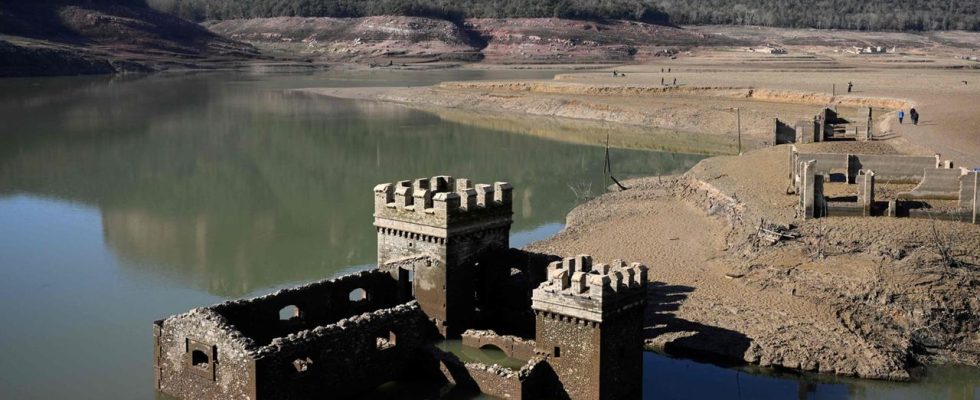In Barcelona, conspicuous posters say: “Drought! Help save water”. There has been too little rain in Catalonia for three years. This also has consequences for tourism – and quite different ones.
The greater Barcelona area would have been happy to do without these guests: people come to the Pantá de Sau reservoir every day. It actually supplies Barcelona with drinking water. Actually. These days, visitors look at the great emptiness. The dam no longer deserves its name. An old church has reappeared and houses from the last century. The water sports club towers far away over ruins where the shore once was. It seems spooky.
The Catalan government declared a drought emergency weeks ago. Tourists are now being made aware of the precarious situation at the airport, on subways and with brochures in hotel rooms. Guests are encouraged to use a cup of water to brush their teeth. And when flushing the toilet – if possible – always use the water saving button.
Water is as valuable as oil
A murmur can be heard in Barcelona. Water will become the oil of the future faster than expected: a scarce, expensive commodity. Catalan agriculture already has to save massive amounts of water. Trees and flowers are no longer allowed to be watered with drinkable water. Fountains are turned off, as are the showers on the beach. Many hotels lack plugs in the bathtubs to prevent guests from taking full baths.
The Spanish weather service does not yet have a final explanation for the ongoing drought. One thing is clear: the greater Barcelona area has been lacking winds that bring clouds and moisture for three years. The desalination plants around the city run continuously to extract water from the sea and make it drinkable.
Posters and signs in Barcelona say, among other things: “Save water! It doesn’t fall from the sky anymore!”
Desalination plant for pools
“Save water! It won’t fall from the sky anymore!” warn other posters that are also hanging in the holiday resorts of the Costa Brava, north of Barcelona. Hoteliers are worried about the beginning of the holiday season. The pools are mostly still full from last year, but as the days get warmer and water evaporates, refilling is prohibited.
In Lloret de Mar, hoteliers have now bought a desalination plant just for hotel pools for 1.5 million euros. “It is our only chance to keep pools open as long as the drought emergency applies,” says the head of the hotel association, Enric Dotras. Operations are scheduled to start in May. Other hotels have already informed their customers before departure that pools and wellness areas will remain closed this Easter holiday.
Environmentalists are calling for a tourism limit
For some environmentalists, the restrictions on tourists do not go far enough. They demand a limit. “Water prices have already risen by 30 percent since January. Citizens are paying for the crisis, while tourism is getting away unscathed. This can lead to social conflicts. Something is building up,” says Dante Maschio from the organization “Aigua és Vida”, in German: “Water is life”.
Barcelona is one of the hottest destinations for city trips in Europe. A major sporting event also takes place in the summer – the “America’s Cup”, the world-famous regatta. Then there will be even more tourists than usual, says Maschio and wonders where the water will come from.

